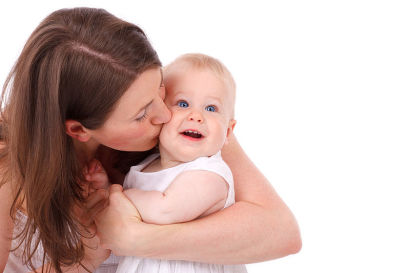A Modern Orthodox Miracle
by Heather Robinson

For one religious single woman, unmarried motherhood is a gift.
Divorced and childless at 23, each year for the next decade on Rosh HaShanah, Julie Yusupov would walk to her synagogue and, in hopes of one day becoming a mother, say a traditional prayer on the welfare of children for parents and those who hope to become parents. She also prayed to find the right husband with whom to start a family.
Last year on Yom Kippur, one of her prayers was answered.
Yusupov, 36, a consultant with large, almond-shaped brown eyes and shiny black hair, became pregnant and gave birth to a son, Jonathan Alexander (Hebrew name Yonatan Shlomo, nicknamed Yoni), now 13 months. At the time, Yusupov, who considers herself Modern Orthodox, was single, and she still is.
Born into a traditional Sephardic family that emigrated from the former Soviet Union in 1991, Yusupov never imagined herself as a single mother.
“I wanted kids with a husband — the full package,” she said recently over lunch at a Midtown vegetarian restaurant.
She and Yoni have received a warm reception from her family’s Modern Orthodox community in Atlantic Beach, on Long Island, and from her family’s Modern Orthodox synagogue there. In the days after she learned she was pregnant, she also received support from what she considered “her” community of Modern Orthodox singles and young marrieds in Manhattan, including her synagogue, Chabad of the Upper West Side. In particular, one rebbetzin’s words — “Everyone sins differently” — comforted her.
“It was a nice thing to say, very appropriate, and it stuck with me,” she recalled.
Hearing her story, one is struck by Yusupov’s deep religious faith and her sense of the rightness of single motherhood for her and for Yoni.
“It all comes from above,” she said. “Now that I have Yoni, I feel he was always a part of my life and it had to be under these circumstances. I feel God has given me something; there is no reason to question why.”
Her story also prompts the question: If family is indeed the heart of Judaism, must that family consist of the traditional father, mother, and children? And does Judaism — especially the Orthodox branch — contain enough flexibility to accept and nurture individuals whose paths to family, including parenthood, are unconventional?
When Yusupov told Yoni’s father that she was pregnant, he — a friend who is also modern Orthodox — said he didn’t want to get married and suggested that it would be prudent for Yusupov to abort.
Yusupov agreed with the decision they not marry. But when it came to the pregnancy, she disagreed.
“I was 34 when I got pregnant — there was no reason to abort,” she said. “It was against all my beliefs.”
She feels no bitterness toward Yoni’s father, who has chosen not to be involved.
“Yoni’s father and I were given a test and we reacted differently,” she said. “It wasn’t easy but once it happened, I couldn’t do anything about it, so therefore I needed to accept it.”
When Yusupov told her mother she was pregnant, she was supportive.
“My Mom said, ‘What’s the problem?’” Yusupov said. “I’m sure she’d prefer me being married, but she was very happy for me; she wanted me to have kids one way or another.
“She said motherhood was the greatest gift she’s had and wanted me to have the same experience. Her strong support has definitely helped me a lot.”
During her pregnancy, Yusupov, who holds a degree in finance from Stern College and worked for a Manhattan hedge fund, moved back to her family’s home in Atlantic Beach. Today, she commutes to work in Manhattan several days a week, and works other days from home. During the day, her mother watches Yoni, and her grandmother pitches in.
She left it to her mother to share the news about her pregnancy with her father, whose Hebrew middle name Yoni shares (“We are Sephardic so it’s permitted,” she explained) and the rest of the family. Prior to Yoni’s first birthday, her father added a balcony to the house in time for the celebration.
Her sister, who is married with four children, lives nearby, so Yoni’s cousins — three boys and a girl — are a big part of his life.
There are moments when Yusupov wishes she had a husband with whom to share something cute or special that Yoni does. But she adds that her relatives help to “fill that space.”
In Yoni’s birth, 12 days past her due date and without inducement on Yom Kippur Day 2013, she says she sees “the hand of God.”
After her son was born, Yusupov’s grandmother revealed to her that her own beloved grandfather (Yoni’s great-great grandfather), who died in the Holocaust and for whom no child had ever been named, was named Jonathan, which means “gift from God.”
“I always loved the name Jonathan but I didn’t know why,” said Yusupov.
“I want Yoni to be a happy person with everything in life,” she said. “I don’t want him to grow up thinking he was an accident.
“He is my blessing. Hashem wanted him to be here.”
———
This article first appeared in The Jewish Week

This entry was written by Heather Robinson and posted on November 4, 2014 at 6:22 pm and filed under Commentary. permalink. Follow any comments here with the RSS feed for this post. Keywords: . Post a comment or leave a trackback: Trackback URL. */?>



